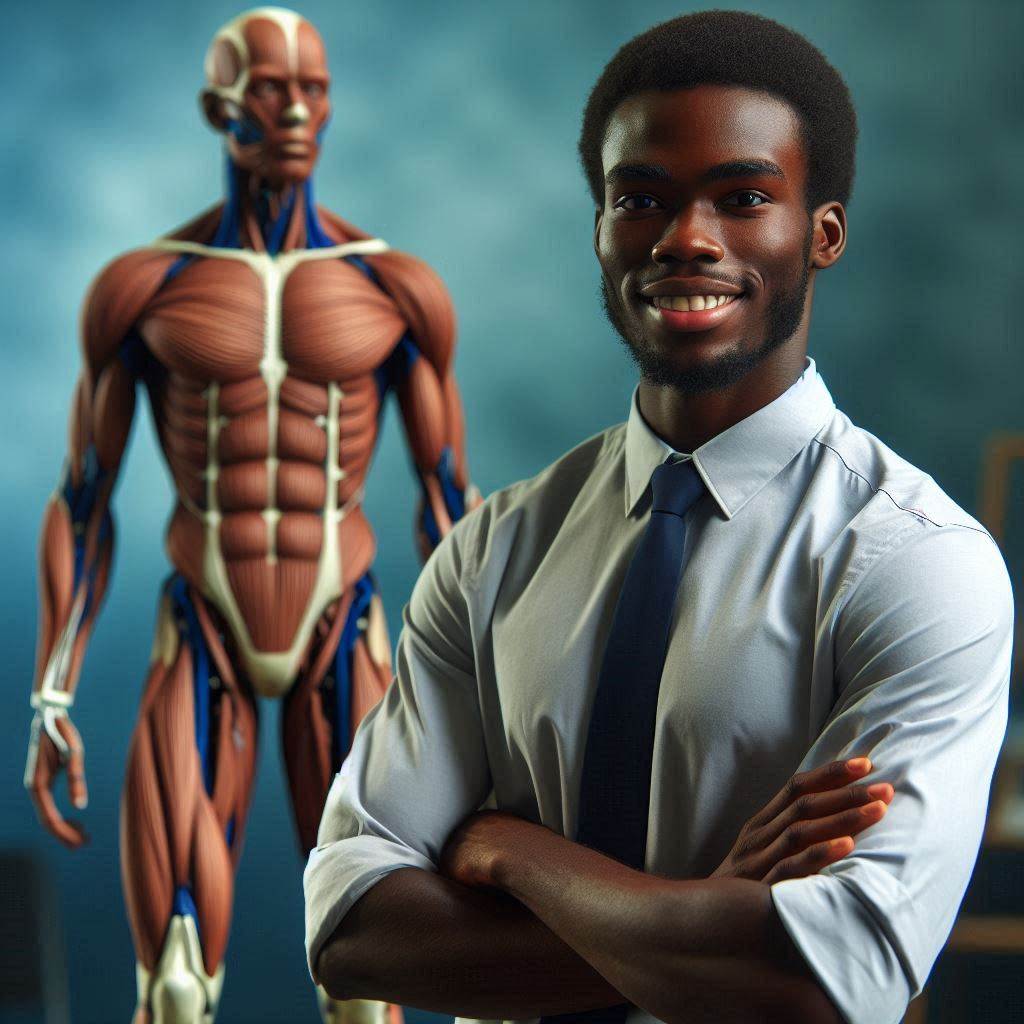Introduction
Human Kinetics Education encompasses physical activities, sports, and exercise science. It’s pivotal for holistic development.
Globally, its roots trace back to ancient civilizations like Greece and China. These cultures emphasized physical education for health and military prowess.
In Nigeria, Human Kinetics Education emerged during colonial rule. British influence introduced rudimentary physical training in schools.
Post-independence, the nation prioritized sports development, reflecting its cultural diversity.
Today, Human Kinetics Education in Nigeria integrates indigenous practices with modern techniques. It addresses societal health challenges and nurtures talent.
Its importance extends beyond physical health to mental and social well-being.
This chapter sets the stage for exploring Nigeria’s journey in Human Kinetics Education.
From colonial legacies to contemporary innovations, the nation’s narrative mirrors global trends.
As we delve deeper, we’ll uncover pivotal milestones and challenges, shaping the landscape of physical education in Nigeria.
Early Development of Human Kinetics Education in Nigeria
Influence of colonialism on the education system in Nigeria
Colonial rulers shaped Nigerian education, emphasizing Western ideals. They imposed their curriculum, focusing on academic subjects.
Physical education wasn’t prioritized; colonial authorities saw it as secondary. Their emphasis neglected traditional Nigerian physical activities.
This system aimed to produce clerks and civil servants for colonial administration.
Nigeria’s indigenous physical activities were sidelined by colonial education. Local cultures’ holistic approach to physical activity was undermined.
Introduction of physical education in schools during the colonial era
Physical education was introduced in Nigerian schools by colonial authorities. This was to promote health and fitness among students.
However, it was often limited to drills and exercises. Emphasis was more on discipline and obedience than holistic development.
Sports were seen as a means to instill British values. This approach failed to integrate indigenous physical activities.
Establishment of the first institutions offering Human Kinetics Education in Nigeria
The first institutions offering Human Kinetics Education emerged post-independence. They aimed to rectify the shortcomings of colonial physical education.
These institutions integrated Western knowledge with indigenous practices. Universities like the University of Ibadan pioneered this interdisciplinary approach.
Human Kinetics Education became a recognized academic field. It encompassed physiology, sports science, and indigenous physical practices.
These institutions sought to reclaim Nigerian cultural heritage in physical education. They emphasized the importance of community and holistic well-being.
Overall, they laid the foundation for a more culturally sensitive approach.
Read: Early Childhood Education Standards in Nigeria
Evolution of Human Kinetics Education in Independent Nigeria
Integration of Human Kinetics Education into the national curriculum
In independent Nigeria, the integration of human kinetics education into the national curriculum was a significant milestone.
- This integration aimed to promote physical wellness and overall health among students.
- It emphasized the importance of sports and physical education in the development of individuals.
- Through this integration, schools were required to offer structured physical education programs.
- It provided students with the opportunity to engage in various sports activities and improve their fitness levels.
- Human kinetics education became an essential component of the holistic development of students.
Role of government policies and initiatives in promoting Human Kinetics Education
The Nigerian government played a crucial role in promoting human kinetics education through various policies and initiatives.
- The government allocated resources to improve sports infrastructure in schools and universities.
- It introduced scholarship programs to support students pursuing degrees in human kinetics.
- Government policies focused on enhancing the quality of physical education programs across the country.
- Initiatives such as the National Sports Commission supported the development of sports at the grassroots level.
- These efforts aimed to nurture talent and promote a culture of fitness and wellness among Nigerians.
Growth of sports and physical education programs in schools and universities
Over the years, there has been significant growth in sports and physical education programs in schools and universities in Nigeria.
- Schools have established sports teams and competitions to foster a spirit of healthy competition among students.
- Universities offer specialized courses in human kinetics to train professionals in the field.
- Physical education has become a core subject in many educational institutions, emphasizing the importance of an active lifestyle.
- Sports facilities have been upgraded to provide students with state-of-the-art equipment and training grounds.
- The growth of sports programs has led to an increase in participation rates and a greater appreciation for physical fitness.
By focusing on the integration of human kinetics education, government policies, and the growth of sports programs, Nigeria has made significant strides in promoting physical wellness and sports development among its citizens.
The evolution of human kinetics education in independent Nigeria highlights the importance of a holistic approach to education that includes physical fitness as a core component of academic growth.
Read: Role of Play-Based Learning in Nigerian Preschools
Challenges and Obstacles Faced by Human Kinetics Education in Nigeria
Lack of funding and resources for sports facilities and programs
The lack of adequate funding and resources is a major challenge facing human kinetics education in Nigeria.
Most schools and institutions struggle to acquire the necessary equipment and facilities for effective sports programs.
Without proper funding, it becomes difficult to maintain existing facilities or invest in new ones.
Limited awareness and understanding of the importance of physical education
Another obstacle is the limited awareness and understanding of the importance of physical education in Nigeria.
Many people do not recognize the significance of incorporating physical activities into the education system.
This lack of awareness leads to a lower priority being placed on human kinetics education.
Issues of gender inequality and inclusivity in sports and physical activities
Gender inequality and inclusivity are also challenges faced by human kinetics education in Nigeria.
Women and girls often face barriers and discrimination when participating in sports and physical activities.
This lack of inclusivity can discourage participation and limit opportunities for individuals to engage in physical education programs.
Achievements and Milestones in Human Kinetics Education in Nigeria
Human Kinetics Education in Nigeria has had a significant impact on various aspects of the nation’s sporting landscape.
Here are some key achievements and milestones in the field:
Success stories of Nigerian athletes and sports teams at international competitions
Nigeria has a rich history of producing world-class athletes who have excelled on the global stage.
Transform Your Career with Expert Guidance
Get personalized mentorship consulting that’s tailored to your unique path. Our expert advice is actionable and exclusive.
Get StartedAthletes like Chioma Ajunwa, Blessing Okagbare, and Kanu Nwankwo have brought glory to Nigeria in various sports.
Nigerian sports teams have also enjoyed success, with the Super Eagles winning the African Cup of Nations multiple times.
These achievements serve as a testament to the quality of human kinetics education in Nigeria.
Development of sports leagues and organizations in Nigeria
In recent years, the development of sports leagues and organizations in Nigeria has led to increased participation in various sports.
The Nigerian Professional Football League, the Nigerian Basketball Federation, and the Nigerian Athletics Federation are just a few examples of successful sports organizations.
These leagues and organizations provide a platform for athletes to showcase their talents and compete at the highest level.
The growth of these sports bodies highlights the importance of human kinetics education in nurturing sporting talent in Nigeria.
Impact of Human Kinetics Education on public health and wellness
Human Kinetics Education in Nigeria plays a vital role in promoting public health and wellness across the country.
Physical education programs in schools help to instill healthy habits in children from a young age.
Community sports initiatives and fitness programs have also been successful in encouraging active lifestyles among Nigerians.
The emphasis on physical activity and exercise in human kinetics education has contributed to improving the overall health and well-being of the Nigerian population.
In short, the achievements and milestones in Human Kinetics Education in Nigeria are a testament to the importance of sports and physical education in the country.
From the success of Nigerian athletes on the global stage to the development of sports leagues and organizations, human kinetics education continues to play a crucial role in shaping the nation’s sporting landscape and promoting public health and wellness.
Read: Early Childhood Education and Special Needs in Nigeria

Current State of Human Kinetics Education in Nigeria
Human Kinetics education in Nigeria has come a long way since its inception.
Today, there are several programs and institutions offering courses in this field, catering to the growing interest in sports science and technology.
Let’s take a closer look at the current state of Human Kinetics education in Nigeria.
Overview of Existing Programs and Institutions
Several universities and colleges in Nigeria offer programs in Human Kinetics and related fields.
Some of the prominent institutions include the University of Lagos, Obafemi Awolowo University, and Ahmadu Bello University.
These programs cover a wide range of subjects, including sports management, exercise physiology, and biomechanics.
Students have the opportunity to pursue undergraduate, postgraduate, and doctoral studies in Human Kinetics.
Internship programs and practical training are also part of the curriculum to provide hands-on experience.
Trends and Developments in Sports Science and Technology
Nigeria has seen a significant increase in the adoption of sports science and technology in recent years.
Advancements in sports analytics, wearable technology, and virtual reality training have revolutionized the way athletes train and compete.
Sports scientists and researchers are constantly exploring new methods to enhance athletic performance and prevent injuries.
Nigerian athletes are now benefiting from cutting-edge training techniques and personalized coaching programs.
The integration of sports science in coaching and training has led to improved results in various sporting disciplines.
Efforts to Promote Sports and Physical Education at the Grassroots Level
There is a growing recognition of the importance of sports and physical education at the grassroots level in Nigeria.
Government agencies, sports federations, and non-profit organizations are actively promoting sports participation among young people.
Schools and community centers are implementing sports and fitness programs to encourage healthy living and physical activity.
Special initiatives are targeting underprivileged communities to provide access to sports facilities and training opportunities.
Sports competitions, talent identification programs, and coaching clinics are being organized to nurture young talent and promote sports development.
In general, the current state of Human Kinetics education in Nigeria is vibrant and evolving.
With a strong emphasis on academic excellence, practical training, and technological advancements, the future looks promising for sports science and physical education in the country.
Read: Innovations in Early Childcare Education in Nigeria
Gain More Insights: Community-Based Agricultural Projects in Nigerian Schools
Future Prospects and Recommendations for Human Kinetics Education in Nigeria
Strategies to improve funding and resources for sports programs
In order to enhance the quality of Human Kinetics Education in Nigeria, it is imperative to prioritize funding and allocate adequate resources to sports programs.
The government, private sector, and international organizations should collaborate to provide sustainable financial support for the development of sports education in the country.
One key strategy is to establish a dedicated fund specifically for sports education, which can be utilized for infrastructure development, training of coaches and instructors, procurement of sports equipment, and organization of competitions and events.
This fund should be managed transparently with clear accountability mechanisms to ensure that resources are used efficiently and effectively.
Furthermore, efforts should be made to encourage corporate organizations to invest in sports development by sponsoring programs and initiatives that promote physical activity and healthy lifestyles.
Public-private partnerships can play a significant role in leveraging resources and expertise to enhance the quality and reach of sports education in Nigeria.
Advocacy for the inclusion of Human Kinetics Education in school curricula
Another important aspect of improving human kinetics education in Nigeria is to advocate for the formal inclusion of sports and physical education in school curricula at all levels.
Physical activity is essential for the overall development of children and young people, and integrating it into the academic curriculum can help to instill lifelong habits of health and fitness.
Advocacy efforts should focus on raising awareness about the benefits of physical education and highlighting its importance in enhancing academic performance, mental well-being, and social skills.
Educators, policymakers, parents, and community leaders should collaborate to prioritize sports education in schools.
They must ensure its recognition and support in educational planning.
Importance of partnerships and collaborations with government, private sector, and international organizations
Collaboration is key to the success of human kinetics education in Nigeria, and partnerships with various stakeholders can help to leverage resources, expertise, and networks to advance the field.
The government should work closely with private sector organizations and international agencies to build sustainable partnerships that support the development of sports education at all levels.
By collaborating with the private sector, the government can tap into additional sources of funding, infrastructure, and technical support to enhance the quality of sports programs and initiatives.
International organizations can also play a crucial role in expanding the reach and impact of sports education in Nigeria by providing technical assistance, best practices, and opportunities for collaboration and knowledge exchange.
Improving funding, advocating curriculum inclusion, and fostering partnerships can ensure promising prospects for human kinetics education in Nigeria.
By working together towards a common goal of promoting physical activity and sports education, Nigeria can harness the immense potential of its youth and build a healthier, more active society for generations to come.
See Related Content: Exploring Agricultural Science Workshops in Nigeria
Conclusion
The history of Human Kinetics Education in Nigeria has evolved significantly over the years.
It has transitioned from a focus on traditional sports to a more holistic approach that encompasses physical education.
The promotion of sports and physical education is crucial for national development in Nigeria.
By investing in Human Kinetics Education, stakeholders can contribute to building a healthier and more active society.
It is essential for the government, educational institutions, and communities to support and prioritize this field of study.
Together, we can empower individuals to lead healthier lifestyles and contribute to the overall well-being of the nation.
Let us all work towards promoting sports and physical education for a brighter and more active future for Nigeria.




